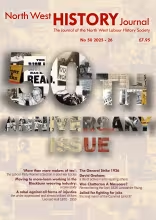Issue 50
‘More than mere makers of tea’: the Labour Party Women’s Section in post war Eccles by Eddie Little & Pat Bowker
Moving to more-loom working in the Blackburn weaving industry: a case study by Richard J Holden with Richard W Hall
A rebel against all forms of injustice: the under appreciated and almost brilliant William Leonard Hall 1870 – 1916 by David Hargreaves
The General Strike 1926 by Ruth and Eddie Frow, with a short introduction by Paula Moorhouse
David Graham: a life of activism and inspiring others by Dave McNally
Was Chatterton A Massacre? Remembering the April 1826 Lancashire Rising by David Gordon Scott and Kate Hurst
Jailed for fighting for jobs: the long march of the Cammell Laird 37 by Pete Cresswell A good read?
North West HISTORY Journal
No 50, 2025 - 26
EDITORIAL
Welcome to the 50th edition of the journal of the North West Labour History Society. It was back in 2023 that we celebrated the 50th anniversary of the formation of the society. It took a couple of years for the group to produce the first printed bulletin in 1975; from the onset, the content was of a high calibre: Ruth and Eddie Frow and Ron Bean on the General Strike in Manchester and on Merseyside and two articles by authoritative writers on Chartism: Neville Kirk on the decline of Chartism in SE Lancashire 1850-1870 and Iorwerth Prothero, on Chartism in the North West. As a gift to all our members, we’ve created a free to download PDF of that first bulletin; details on the next page. In physical appearance, those early bulletins were modest affairs: monochrome, A5 sized, Roneo-ed and stapled but from those humble beginnings grew the journal as we know it today.
Pat Bowker joined the Society just a few years after its inception. This summer, members of the committee were delighted to join her for her 90th birthday celebration lunch. In this edition she shares her recollections of women’s activism in the Labour Party of the 1950s.
In May 1926, Eddie Frow, an apprentice at an engineering firm in Salford, downed tools and walked out on strike. He was not alone. It is estimated than 1.7 million workers across the country took part in action during the nine days of the first, and largest, general strike in the UK. Workers across multiple industries came out in support of members of the Miners’ Federation of Great Britain who were embroiled in a long running dispute with mine owners. The catalyst came when one million miners were locked out of work for refusing to accept a longer working day for lower pay. Events next year will mark the centenary of the General Strike.
One of the aims of the society and of this publication is to ferret out less well known aspects of our history. We’ve all heard of the Peterloo Massacre but our authors contend that professional soldiers firing rifles at a crowd of unarmed handloom weavers in the village of Chatterton in 1826 also meets the definition of a massacre. A series of events commemorating the Lancashire Rising will take place across the region next Spring. Look out on our website for details. A more constructive approach to employer/worker relationships is explored in a case study of two small family owned mills in Blackburn in the 1930s.
To round off this edition we have articles featuring a selection of courageous rebels: David Graham, Leonard Hall and the Cammell Laird strikers.
Many tributes were paid to two remarkable women who died earlier this year; both had some small connection to this journal: one as a subject and the other as a valued contributor. The campaigning tenacity of Anne Harper, better known as Anne Scargill, and the other members of Women Against Pit Closures, remain an inspiration to all activists. Marika Sherwood’s own experiences as a Jewish child born in Hungary in 1937 made her a lifelong opponent of all forms of racism and oppression, including that of the Palestinian people.
Like all good projects, production of this journal is a collaborative effort. My thanks to Mike Carter for design, to all members of the Editorial Board, to our authors, advertisers, subscribers and readers.
Paula Moorhouse

